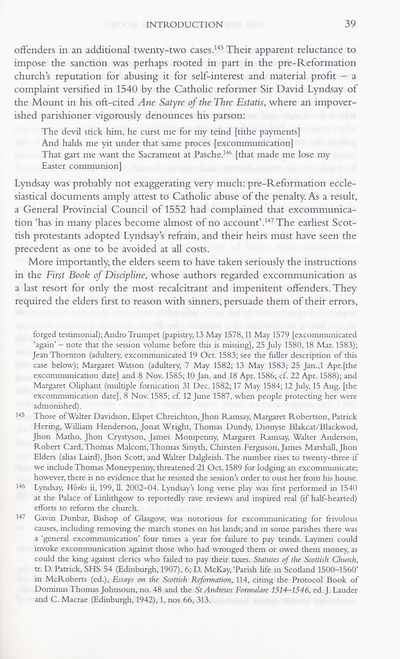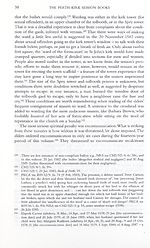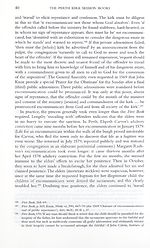Series 6 > Perth Kirk Session books, 1577-1590
(54) Page 39
Download files
Complete book:
Individual page:
Thumbnail gallery: Grid view | List view

INTRODUCTION
39
offenders in an additional twenty-two cases.145 Their apparent reluctance to
impose the sanction was perhaps rooted in part in the pre-Reformation
church’s reputation for abusing it for self-interest and material profit - a
complaint versified in 1540 by the Catholic reformer Sir David Lyndsay of
the Mount in his oft-cited Ane Satyre of the Thre Estatis, where an impover¬
ished parishioner vigorously denounces his parson:
The devil stick him, he curst me for my teind [tithe payments]
And halds me yit under that same proces [excommunication]
That gart me want the Sacrament at Pasche.146 [that made me lose my
Easter communion]
Lyndsay was probably not exaggerating very much: pre-Reformation eccle¬
siastical documents amply attest to Catholic abuse of the penalty. As a result,
a General Provincial Council of 1552 had complained that excommunica¬
tion ‘has in many places become almost of no account’.147 The earUest Scot¬
tish protestants adopted Lyndsay s refrain, and their heirs must have seen the
precedent as one to be avoided at all costs.
More importantly, the elders seem to have taken seriously the instructions
in the First Book of Discipline, whose authors regarded excommunication as
a last resort for only the most recalcitrant and impenitent offenders. They
required the elders first to reason with sinners, persuade them of their errors,
forged testimonial); Andro Trumpet (papistry, 13 May 1578,11 May 1579 [excommunicated
‘again’ - note that the session volume before this is missing], 25 July 1580,18 Mar. 1583);
Jean Thornton (adultery, excommunicated 19 Oct. 1583; see the fuller description of this
case below); Margaret Watson (adultery, 7 May 1582; 13 May 1583; 25 Jan.,1 Apr.[the
excommunication date] and 8 Nov. 1585; 10 Jan. and 18 Apr. 1586; cf. 22 Apr. 1588); and
Margaret Oliphant (multiple fornication 31 Dec. 1582; 17 May 1584; 12 July, 15 Aug. [the
excommunication date], 8 Nov. 1585; cf. 12 June 1587, when people protecting her were
admonished).
145 Those of Walter Davidson, Elspet Chreichton, Jhon Ramsay, Margaret Robertson, Patrick
Hering, William Henderson, Jonat Wright, Thomas Dundy, Dionyse Blakcat/Blackwod,
Jhon Matho, Jhon Crystyson, James Monipenny, Margaret Ramsay, Walter Anderson,
Robert Card, Thomas Malcom, Thomas Smyth, Chirsten Ferguson, James Marshall, Jhon
Elders (alias Laird), Jhon Scott, and Walter Dalgleish. The number rises to twenty-three if
we include Thomas Moneypenny, threatened 21 Oct. 1589 for lodging an excommunicate;
however, there is no evidence that he resisted the session s order to oust her from his house.
146 Lyndsay, Works ii, 199,11. 2002-04. Lyndsay’s long verse play was first performed in 1540
at the Palace of Linlithgow to reportedly rave reviews and inspired real (if half-hearted)
efforts to reform the church.
147 Gavin Dunbar, Bishop of Glasgow, was notorious for excommunicating for frivolous
causes, including removing the march stones on his lands; and in some parishes there was
a ‘general excommunication’ four times a year for failure to pay teinds. Laymen could
invoke excommunication against those who had wronged them or owed them money, as
could the king against clerics who failed to pay their taxes. Statutes of the Scottish Church,
tr. D. Patrick, SHS 54 (Edinburgh, 1907), 6; D. McKay, ‘Parish life in Scotland 1500-1560’
in McRoberts (ed.). Essays on the Scottish Reformation, 114, citing the Protocol Book of
Dominus Thomas Johnsoun, no. 48 and the St Andrews Formulare 1514-1546, ed.J. Lauder
and C. Macrae (Edinburgh, 1942), 1, nos 66, 313.
39
offenders in an additional twenty-two cases.145 Their apparent reluctance to
impose the sanction was perhaps rooted in part in the pre-Reformation
church’s reputation for abusing it for self-interest and material profit - a
complaint versified in 1540 by the Catholic reformer Sir David Lyndsay of
the Mount in his oft-cited Ane Satyre of the Thre Estatis, where an impover¬
ished parishioner vigorously denounces his parson:
The devil stick him, he curst me for my teind [tithe payments]
And halds me yit under that same proces [excommunication]
That gart me want the Sacrament at Pasche.146 [that made me lose my
Easter communion]
Lyndsay was probably not exaggerating very much: pre-Reformation eccle¬
siastical documents amply attest to Catholic abuse of the penalty. As a result,
a General Provincial Council of 1552 had complained that excommunica¬
tion ‘has in many places become almost of no account’.147 The earUest Scot¬
tish protestants adopted Lyndsay s refrain, and their heirs must have seen the
precedent as one to be avoided at all costs.
More importantly, the elders seem to have taken seriously the instructions
in the First Book of Discipline, whose authors regarded excommunication as
a last resort for only the most recalcitrant and impenitent offenders. They
required the elders first to reason with sinners, persuade them of their errors,
forged testimonial); Andro Trumpet (papistry, 13 May 1578,11 May 1579 [excommunicated
‘again’ - note that the session volume before this is missing], 25 July 1580,18 Mar. 1583);
Jean Thornton (adultery, excommunicated 19 Oct. 1583; see the fuller description of this
case below); Margaret Watson (adultery, 7 May 1582; 13 May 1583; 25 Jan.,1 Apr.[the
excommunication date] and 8 Nov. 1585; 10 Jan. and 18 Apr. 1586; cf. 22 Apr. 1588); and
Margaret Oliphant (multiple fornication 31 Dec. 1582; 17 May 1584; 12 July, 15 Aug. [the
excommunication date], 8 Nov. 1585; cf. 12 June 1587, when people protecting her were
admonished).
145 Those of Walter Davidson, Elspet Chreichton, Jhon Ramsay, Margaret Robertson, Patrick
Hering, William Henderson, Jonat Wright, Thomas Dundy, Dionyse Blakcat/Blackwod,
Jhon Matho, Jhon Crystyson, James Monipenny, Margaret Ramsay, Walter Anderson,
Robert Card, Thomas Malcom, Thomas Smyth, Chirsten Ferguson, James Marshall, Jhon
Elders (alias Laird), Jhon Scott, and Walter Dalgleish. The number rises to twenty-three if
we include Thomas Moneypenny, threatened 21 Oct. 1589 for lodging an excommunicate;
however, there is no evidence that he resisted the session s order to oust her from his house.
146 Lyndsay, Works ii, 199,11. 2002-04. Lyndsay’s long verse play was first performed in 1540
at the Palace of Linlithgow to reportedly rave reviews and inspired real (if half-hearted)
efforts to reform the church.
147 Gavin Dunbar, Bishop of Glasgow, was notorious for excommunicating for frivolous
causes, including removing the march stones on his lands; and in some parishes there was
a ‘general excommunication’ four times a year for failure to pay teinds. Laymen could
invoke excommunication against those who had wronged them or owed them money, as
could the king against clerics who failed to pay their taxes. Statutes of the Scottish Church,
tr. D. Patrick, SHS 54 (Edinburgh, 1907), 6; D. McKay, ‘Parish life in Scotland 1500-1560’
in McRoberts (ed.). Essays on the Scottish Reformation, 114, citing the Protocol Book of
Dominus Thomas Johnsoun, no. 48 and the St Andrews Formulare 1514-1546, ed.J. Lauder
and C. Macrae (Edinburgh, 1942), 1, nos 66, 313.
Set display mode to:
![]() Universal Viewer |
Universal Viewer | ![]() Mirador |
Large image | Transcription
Mirador |
Large image | Transcription
Images and transcriptions on this page, including medium image downloads, may be used under the Creative Commons Attribution 4.0 International Licence unless otherwise stated. ![]()
| Scottish History Society volumes > Series 6 > Perth Kirk Session books, 1577-1590 > (54) Page 39 |
|---|
| Permanent URL | https://digital.nls.uk/127281285 |
|---|
| Description | Over 180 volumes, published by the Scottish History Society, containing original sources on Scotland's history and people. With a wide range of subjects, the books collectively cover all periods from the 12th to 20th centuries, and reflect changing trends in Scottish history. Sources are accompanied by scholarly interpretation, references and bibliographies. Volumes are usually published annually, and more digitised volumes will be added as they become available. |
|---|


